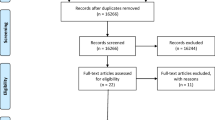Abstract
Mental illness in the criminal justice system is one of the most important and underserved public health challenges in psychiatry today, but few general psychiatry residency programs offer clinical education in correctional psychiatry. Developing such rotations might seem intimidating to educational leaders unfamiliar with the criminal justice system, but a variety of potential solutions exist for residency programs to offer this increasingly important clinical training.
Similar content being viewed by others
References
Williams J, Elbogen E, Kuroski-Mazzei A. Training directors’ self-assessment of forensic education within residency training. Acad Psychiatry. 2014.
Aufderheide D. Mental illness in America’s jails and prisons: toward a public safety/public health model. Health Affairs Blog. 2014 April 1. http://healthaffairs.org/blog/2014/04/01/mental-illness-in-americas-jails-and-prisons-toward-a-public-safetypublic-health-model/. Accessed 17 June 2014.
Steadman HJ, Osher FC, Robbins PC, Case B, Samuels S. Prevalence of serious mental illness among jail inmates. Psychiatr Serv. 2009;60(6):761–5.
James DJ, Glaze LE. Mental health problems of prison and jail inmates. Bureau of Justice Statistics Special Report, 2006 September (revised 2006 December 14). http://www.bjs.gov/content/pub/pdf/mhppji.pdf. Accessed 17 June 2014.
Baillargeon J, Binswanger IA, Penn JV, Williams BA, Murray OJ. Psychiatric disorders and repeat incarcerations: the revolving prison door. Am J Psychiatry. 2009;166(1):103–9.
Glaze LE, Herberman EJ. Correctional populations in the United States, 2012. Bureau of Justice Statistics Bulletin, 2013 December. http://www.bjs.gov/content/pub/pdf/cpus12.pdf. Accessed 17 June 2014.
Schwirtz M. Inmate attacks on civilian staff climb at Rikers. New York Times, 21 May 2014. http://www.nytimes.com/2014/05/22/nyregion/rising-hazard-for-civilian-staff-at-rikers-attacks-by-mentally-ill-inmates.html. Accessed 17 June 2014.
Aufderheide DH, Brown PH. Crisis in corrections: the mentally ill in America’s prison. Correct Today. 2005;67:30–3.
Marrocco MK, Uecker JC, Ciccone JR. Teaching forensic psychiatry to psychiatric residents. Bull Am Acad Psychiatry Law. 1995;23(1):83–91.
ACGME ACGME program requirements for graduate medical education in psychiatry 2007.
Reiss D, Famoroti OJ. Experience of prison psychiatry: a gap in psychiatrists’ basic professional training. Psychiatr Bull. 2004;28:21–2.
Lewis CF. Teaching forensic psychiatry to general psychiatry residents. Acad Psychiatry. 2004;28(1):40–6.
Candilis P, Weinstock R, Martinez R. Forensic ethics and the expert witness. Springer; 2007. p 10.
American Academy of Psychiatry and the Law: Ethics guidelines for the practice of forensic psychiatry, adopted May 2005. http://www.aapl.org/ethics.htm. Accessed 17 June 2014.
Austin J, Coventry G. Emerging issues on privatized prisons. Bureau of Justice Assistance monograph, 2001 February. https://www.ncjrs.gov/pdffiles1/bja/181249.pdf. Accessed 17 June 2014.
Kowalenko T, Cunningham R, Sachs CJ, et al. Workplace violence in emergency medicine: current knowledge and future directions. J Emerg Med. 2012;43(3):523–31.
The Sentencing Project. Report of the Sentencing Project to the United Nations Human Rights Committee Regarding Racial Disparities in the United States Criminal Justice System. http://sentencingproject.org/doc/publications/rd_ICCPR%20Race%20and%20Justice%20Shadow%20Report.pdf. Accessed 17 June 2014.
Robertson MD, Walter G. Many faces of the dual-role dilemma in psychiatric ethics. Aust NZ J Psychiatry. 2008;42(3):228–35.
Acknowledgments
Many thanks to Paul Appelbaum, Charles Scott, Alec Buchanan, Rusty Reeves, David Spagnolo, and Jeffrey Janofsky for helpful comments on this topic.
Disclosures
The author states that there is no conflict of interest.
Author information
Authors and Affiliations
Corresponding author
Rights and permissions
About this article
Cite this article
Fisher, C.E. General Psychiatric Residents and Corrections: Moving Forensic Education Beyond the Classroom. Acad Psychiatry 38, 680–684 (2014). https://doi.org/10.1007/s40596-014-0216-6
Received:
Accepted:
Published:
Issue Date:
DOI: https://doi.org/10.1007/s40596-014-0216-6




